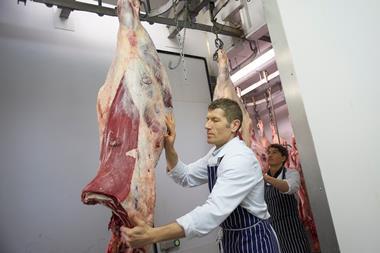The UK is far too reliant on “cheap” and unskilled international labour, argued a new (but tiresomely familiar) report on immigration published on Monday by the rightwing group of backbench MPs the New Conservatives.
Our reliance on such a workforce has driven down wages for British workers and disincentivised business “from investing in skills training or new technology”, said the 25-strong group. They suggest a drastic cut in the current net migration figure by two-thirds to around 220,000 before the next election.
This collection of MPs, which initially boasted a membership including Tory deputy chair and ardent culture warrior ‘30p Lee’ Anderson, plus many more ‘red wall’ Tories, devised a 12-point plan to persuade PM Rishi Sunak to get tougher on immigration.
And their most eye-catching (nay, bonkers) proposal is to close the temporary pandemic schemes that granted visas to more than 80,000 foreign workers in the care sector – which already had 165,000 unfilled posts in 2021/22.
In a heated interview with Mishal Husain on the BBC’s Today Programme on Monday, MP Miriam Cates doubled down on the group’s position.
Cutting off the supply of “cheap foreign labour” would force employers “to look at recruiting local young people” and pay them more for their services, she insisted, while batting away a question around how such a financially stricken sector would fund such a policy, as well as the devastating impact it could have on staffing levels that are already dangerously low.
You’re now probably thinking “why is The Grocer discussing social care policy”?
But the debate around the chronically understaffed care sector bears a striking resemblance to what is a chronically understaffed food and farming industry.
Both are often subject to oversimplified calls for them to become less dependent on “cheap” and “unskilled” workers from abroad. Both sectors have also historically struggled to attract enough staff from the UK.
The demonisation of immigrants
Crucially, apart from empty rhetoric about the need to cut immigration and the demonisation of immigrants, both sectors have heard little in the way of practical solutions from politicians as to where their workers will come from should we see any cut in immigration.
These problems, of course, are not new. The Grocer asked why British workers didn’t want to work as fresh produce pickers as far back as six years ago, while the government’s Pick for Britain scheme during the pandemic attracted so few applicants it was swiftly canned.
And these workers aren’t actually low-skilled. Ex-environment secretary George Eustice argued the case last week when he said the government was “not defining skills correctly”. He added: “If you’re going to have skills [as an immigration criterion], at least recognise the correct skills – and those are dextrous, human skills.”
Despite such rhetoric, the same calls to wean ourselves off these so-called unskilled foreign workers continue, as do vague calls to automate the food sector from populist politicians playing to their anti-immigration base.
We heard it from home secretary Suella Braverman in May, when she blithely suggested there was “no reason” why we couldn’t train up enough truck drivers, butchers or fruit pickers.
But the real truth is that any such move – which is tied to the simplified argument of paying British workers more money than “cheaper” foreign staff – could fuel further food price inflation, and across the wider economy. The food sector requires a more nuanced approach to reduce its dependency on foreign workers.
Delegates at the British Meat Processors Association’s annual conference heard this argument in London last week, when Hildur Einarsdottir, automation centre manager for equipment manufacturer Marel, warned automation in some sectors such as beef would come at an eye-watering cost due to the complexities in processing a cow versus animals such as chickens.
And her comments were echoed by John Shropshire, founder of grower G’s Fresh and leader of Defra’s independent review into labour shortages in the supply chain, which published its long-awaited report on Friday.
A mixed labour and automation approach is needed
Shropshire told The Grocer this week that in many food sectors “the technology just isn’t there yet” to pursue further automation.
His review is instead calling for a mixed approach, which does include looking at automation, and Defra says this year £12.5m in R&D funding has been invested. But it also needs to work alongside action to improve the image of working in the food sector via better careers advice, an investment in skills, marketing campaigns about the benefits of jobs in the industry and reform of the Apprenticeship Levy.
However, at the heart of its proposals is the recognition that any increase in the domestic food industry labour pool will need to be complemented by migrant workers, due to the UK’s low unemployment rate and fierce competition from other sectors. And if that supply line is cut, the offshoring of food production that we’ve already seen will simply grow further – adding further inflationary pressure on the sector.
“We interviewed a major grower for the review that has farms in Portugal and Morocco and is now moving raspberry production abroad,” he says. “We’ve got to get the message over that this will be the result [of moves to cut our dependency on foreign staff].”
As a result, the review is also proposing a five-year scheme for seasonal workers and for the government to consider removing the cap on the total number of visas and extending the length of visas to nine months.
Shropshire’s probe additionally calls for a widening of the eligibility criteria for the skilled worker visa route and reform of the Shortage Occupation List, to allow for greater flexibility when there are shortages of certain types of workers.
And ultimately, he argues immigration has been and will continue to be crucial to filling labour gaps made even worse by Brexit – issues that have also been apparent in areas such as the care sector and elsewhere.
“Every job within the food supply chain is essential and should never be dismissed as menial or unskilled,” says Shropshire.
And to believe anything otherwise is to be kidding ourselves.




















No comments yet